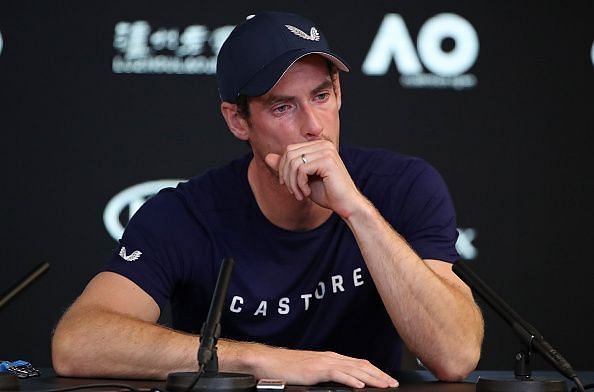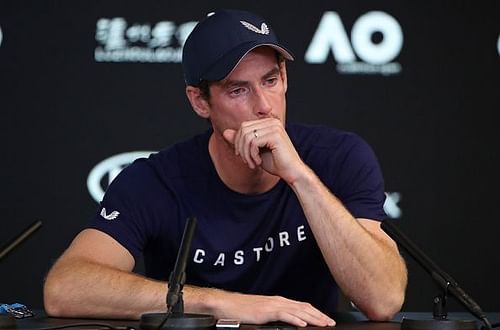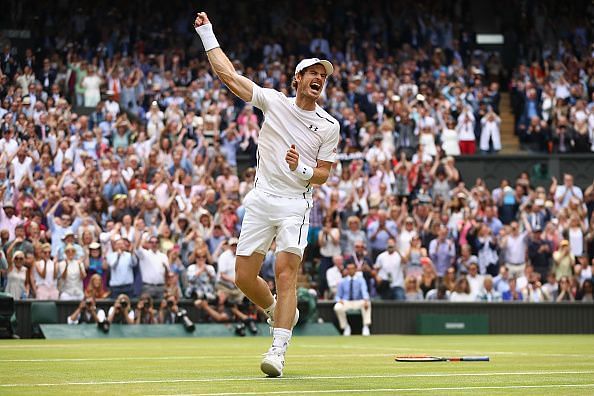
Andy Murray: Statistics don't do justice to the premature end of a great career

"When you try your best, but you don't succeed..."
How often do we see athletes succumbing to injury and having to bid a teary-eyed goodbye to the sport they live and breathe for? Andy Murray's announcement of his retirement from professional tennis came as a shock, but at the same time, serves as a reminder that time is running out for the modern greats of the sports, a.k.a the Big Four.
But, that's not all it reminded us of. It also reminded us of the inevitable measuring stick that he'll fall under - his career statistics.
Statistics, in sport, don't often tell the whole story. After all, it's just a quantitative measurement of a player's career. And, a player's career is more than just a culmination of numbers, isn't it?
For one, romanticism in sports goes way beyond mere stats. The joy of hammering a forehand down the line winner, or hitting an inch-perfect lob when your seemingly clueless opponent attacks the net, can't be described by how many Grand Slams that player has won.
And, numbers don't tell us about all the hard work that has gone behind, all the pain a player has had to go through to achieve all that he/she did. And, neither does it tell you how respectable a character is, off the court.
In no way does statistics do justice to Andy Murray's career, either. For someone coming from a British background with more than half a century's hopes lying on his shoulders ever since he started to make a name for himself on tour, and then fail time and time again, before ultimately achieving the dream, we've seen Murray elevate himself to a warrior, of sorts, without ever changing his on-court persona.
He was unabashed then, he is unabashed still. When he was an up-and-coming youngster, he was different than the rest of the pack, and, when he became a member of the so-called Big Four of men's tennis, he was certainly different than his three legendary contemporaries.
But, the one thing that earned him a seat alongside Roger Federer, Rafael Nadal and Novak Djokovic, was his steely determination. Behind those inch-perfect lobs, and those accurate backhands, was innumerable days of hard work and training.
He was always the statistically lesser accomplished player, but if turning defense into attack was an art form, he'd invariably be the Picasso of it. That's what he based his career on. And, even though he lost time and again, he still came back to prove that he belonged, finally achieving the task that he set out to - that is the ultimate form of determination a person should aim to have.
Murray was never one to shy away from showing his emotions. He wore his heart on his sleeve, and showed blatant emotion in his own way. He cried, he screamed, he relentlessly cursed at his box and at himself whenever he lost a point he shouldn't have.
But, during his press conference on Friday, days before the Australian Open, emotions were at large, and that steely determination was evidently gone. He'd had enough. It's not in him anymore, to keep fighting when he knows the end of the road is too near and can't be averted any longer.
He was never the most physically fit player on tour, but, his problems were never quite as bad as they are now, either. Failure to attain the top spot in the ranking for years is what drove him to mad proportions in 2016, when he simply didn't care about the future implications.
Ultimately, he historically snatched the world number 1 ranking away from Novak Djokovic, overturning a deficit of over 8000 points within half a season, and becoming the only player in the Big Three era to earn the top rank.
But, before that as well, he proved that nothing is impossible. The journey - albeit a painful one - that started at US Open 2008, ended at the same venue, four years later, when the underachieving Brit, guided by the ever-calming presence of Ivan Lendl, finally got what he had long deserved - a Grand Slam title.
And then, he could finally breathe easy at Wimbledon 2013, a year after that painful Wimbledon 2012 final defeat at the hands of Roger Federer. He'd lifted off the lid that had been weighing down on him ever since he turned pro.
But, is that all there is about Andy Murray? Just a humongous hunger to prove everybody wrong and keep believing in himself, that, he too, can? Certainly not! Murray's legacy reaches beyond just what he achieved on the tennis court. He talked to lower-tier players on a regular basis and even guided them about the intricacies of the professional life.
But, what's more, he was a true believer of equality in sports. When the equal payment issue had been gaining ground, there was no male star as open as Murray on the issue. He didn't think twice to openly advocate and embrace equal payment. On countless occasions, he's advocated equal respect for men and women on all fields.
Referring back to the quoted lyric at the beginning of this piece, Andy Murray tried his best, indeed. And, for a while, he did succeed against all odds. Unfortunately for him, that success - regardless of how gigantic it was - was short lived and it dealt a killer blow on the rest of his career.
But, most of all, his press conference showed how he'd been playing through immense pain and adversity all this while. He gave it his all, and it didn't work out as great as he'd hoped it would. Sports' romanticism turning into a tragedy.

He has been termed brash and unlikable countless times for his behavior on court. But, was he though? After all, everything he did on the court, was for his tennis. And, everything he did off it, was for everybody else's. So, you tell me. Did he not succeed in making an everlasting impression? And, did he not prove that sky is the limit, if you want it bad enough? It doesn't matter if the cost of wanting it bad enough ended the rest of your career.